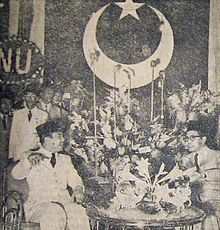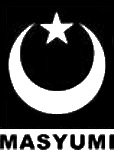Masyumi
Masyumi (after old spelling before 1972: Masjumi), actually an abbreviation for Majelis Syuro Muslimin Indonesia (" Consultative Council of the Muslims of Indonesia"), was an Islamic party of Indonesia that existed between 1945 and 1960 and went back to the Muslim representative body of the same name, which the Japanese military government in November 1943 to better control the Muslims of Indonesia. The party was banned by President Sukarno in August 1960 after it had supported regional uprisings of the "Revolutionary Government of the Republic of Indonesia" ( Pemerintah Revolusioner Republik Indonesia / PRRI ) in the late 1950s .
The Masyumi as a representative body under Japanese occupation
As early as 1937, various Islamic nationalist organizations in the Dutch East Indies had come together in the "Supreme Islamic Council of Indonesia" ( Madjelis Islam A'la Indonesia - MIAI ). After Japanese troops occupied Java in March 1942 , the Japanese military government endeavored to further strengthen the anti-Dutch Islamic groups there and to mobilize them for their anti-Western political and military goals. As early as March 1942, the military government created an office for religious affairs, the so-called Shūmubu , which was placed under Indonesian leadership in October 1943. A month later, the Masyumi was launched, which was conceived as the successor organization to the MIAI, but which was only open to organizations to which the Japanese military government had given official status. These included the traditionalist Nahdlatul Ulama (NU) as well as the modernist Muhammadiyah and two smaller organizations. Muslim scholars could also join the Masyumi personally, but only after receiving the Shūmubu's permission . NU founding chairman Hasyim Asy'ari was appointed chairman of the Masyumi.
After the Japanese government announced its plan to prepare Indonesia for independence in September 1944, Masyumi held a meeting in Jakarta in October 1944 , the final declaration of which stated the goal of preparing the Indonesian Muslim community for "freedom for Indonesia and the." To receive freedom for the religion of Islam. " With the support of the Japanese military government, Masyumi founded a volunteer corps, the Barisan Hizbullah ("The Front of the Party of God") in December 1944 , the aim of which was to achieve solidarity among the Indonesian Muslim community in accordance with the commandments of Islam To fight for the cause of God on the side of Japan and to achieve the independence of Indonesia.
The Masyumi became too powerful for the Japanese military government in the following months, so that it began to strengthen secular groups to compensate . In the 62-member committee for the preparation of Indonesian independence ( Badan Penyelidikan Usah Persiapan Kemerdekaan Indonesia; BPUPKI ), which was set up on March 1, 1945, the Masyumi had only six members, so that his influence in this body was relatively limited . The Pancasila concept presented by Sukarno as a representative of the secular faction on June 1 , according to which not Islam but generally belief in a deity ( ketuhanan ) should be the religious element of the state ideology, was accepted by the representatives of the Masyumi in the committee on June 22 June, after adding the so-called "seven words" ( tujuh kata ) to it. The added phrase provided that the followers of Islam in Indonesia should also be required to obey the Sharia of Islam. This compromise to satisfy the Masyumi members of the committee is known as the Jakarta Charter .
In the weeks that followed, however, the Masyumi experienced a process of political erosion, and some non-Muslims as well as Muslims from the outer islands protested the "seven words". That is why on August 17, 1945, when the draft constitution was publicly discussed, the "seven words" were deleted from its preamble.
Re-establishment as a party

Sukarno's efforts to make his Indonesian National Party ( Partai Nasional Indonesia - PNI ) a unitary party , within which all social conflicts were to be resolved through the principle of consultation, came from the representatives of the major Muslim organizations (NU, Muhammadiyah and those from Sarekat Islam PSII) on November 7, 1945 in Yogyakarta through the re-establishment of the Masyumi as a party. In less than a year it developed into the party with the largest number of members in Indonesia.
The party's political orientation emerges from various programs and manifestos. In the founding program, the Muslims were encouraged to " fight for the cause of God " ( berdjihad fisabilillah ), which was certainly meant in the sense of the struggle for independence. The 1946 program emphasized the need to realize the ideals of Islam in state affairs "so that a form of government can be established based on popular sovereignty and a society based on justice according to the teachings of Islam. " The program also contained a number of progressive demands: a minimum wage for workers, limitation of weekly working hours, social security, an agricultural law to protect smallholders and the improvement of agricultural practices.
A political manifesto dated June 6, 1947 criticized the Pancasila ideology enshrined in the constitution : "The Republic of Indonesia, the majority of the population of which belongs to Islam, must have a constitution based on principles that are in accordance with this religion and not that Doctrines of Islam contradict "At the General Assembly in March 1948 a demand was made on the government to make religious education compulsory in elementary and secondary schools.
Later development
According to the understanding of its founders, the Masyumi should be the only political Islamic party in Indonesia. Gradually, however, various member organizations broke away from the Masyumi and again founded their own parties. The first split occurred in July 1947 when a number of members under the leadership of Wondoamiseno and Arudji Kartawinata re-established the old Partai Sarekat Islam Indonesia (PSII) in order to participate in the left-wing government of Amir Sjarifuddin. After the party council ( madjlis sjuro ), in which many religious scholars were represented, had been devalued to a purely advisory body in 1949 , the NU withdrew from the Masyumi in April 1952 and reorganized itself as a party. The immediate reason for the split was the dispute over the post of minister of religion in Wilopo's cabinet.
Modernist Muslims of the Muhammadiyah now began to dominate the Masyumi more and more. According to the statutes of August 1952, the Masyumi defined itself as a party founded on Islam and aimed at "implementing the teaching and law of Islam in the life of the individual, society and the Republic of Indonesia as a state." thus to gain the pleasure of God. " In the parliamentary elections of 1955, Wahle received 20.9 percent of the vote, making it the second strongest party behind the PNI, which received 22.3 percent. In the years following the election, the Masyumi remained in opposition for most of the time.
Although Masyumi, NU and PSII rivaled each other as parties, they also worked together at times. In the run-up to the elections in 1955, the three parties agreed, together with the Sumatran party Pergerakan Tarbiyah Islamiyah (PerTI), to abstain from any attacks on one another. In the Constituent Assembly, which was convened in Bandung in November 1956 to draft a definitive constitution for Indonesia to replace that of 1945, Masyumi again worked with the other Islamic parties to replace the pancasila as the basic principle of the state with Islam allow. Against this Islamic bloc, another bloc was formed within the Constituent Assembly, which advocated the preservation of the pancasila as a constitutional principle. Neither of the two blocs had the two-thirds majority required to amend the constitution, so that Sukarno finally dissolved the constituent assembly in July 1959 and consequently proclaimed the principle of guided democracy . The Masyumi had compromised itself as a political force in 1958 by supporting regional uprisings of the PRRI and was disbanded in August 1960.
After the ban
After the party was banned, former members and supporters founded the "Crescent Star Family" ( Keluarga Bulan Bintang ), named after the party logo , to fight for the implementation of Islam and Sharia law at the state level. At the beginning of Suharto's reign there were attempts to re-establish the old Masyumi party, but this was prevented by the state. After Suharto's fall in 1988, former members of the Masyumi founded the "Crescent Star Party" ( Partai Bulan Bintang ) as the successor party , which participated in all subsequent parliamentary elections but has never won more than 2.5 percent of the vote.
literature
- Harry Benda: The Crescent and the Rising Sun. Indonesian Islam under the Japanese Occupation, 1942-1945 . The Hague 1958. pp. 150-169.
- BJ Boland: The Struggle of Islam in Modern Indonesia. The Hague: Martinus Nijhoff 1971. Reprint 1982. pp. 42-49.
- Harold Crouch: Art. "Masjumi" in John L. Esposito (ed.): The Oxford Encyclopedia of the Islamic World. 6 Vols. Oxford 2009. Vol. III, pp. 515a-516b.
- Rémy Madinier: L'Indonesie, entre démocratie musulmane et Islam intégral: histoire du parti Masjumi (1945-1960) . Paris: Éd. Karthala [u. a.] 2012.
- O. Schumann: Art. "Masjumi" in The Encyclopaedia of Islam. New Edition Vol. VI, pp. 730a-733a.
Individual evidence
- ↑ See Benda 151.
- ↑ Quoted in Schumann 730b.
- ↑ See Schumann 730b.
- ↑ See Schumann 731a.
- ↑ See Boland 43.
- ↑ Quoted from Boland 43.
- ↑ See Boland 44.
- ↑ Quoted from Boland 44.
- ↑ See Boland 44.
- ↑ See Boland 45.
- ↑ See Boland 46.
- ↑ See Robin Bush: Nahdlatul Ulama and the Struggle for Power within Islam and Politics in Indonesia . Singapore 2009. pp. 43-53.
- ↑ Quoted from Boland 49.
- ↑ See Boland 47.
- ↑ See Schumann 732b-733a.
